Natural Remedies For Anxiety & Stress: Top 7 Useful Ways 2024
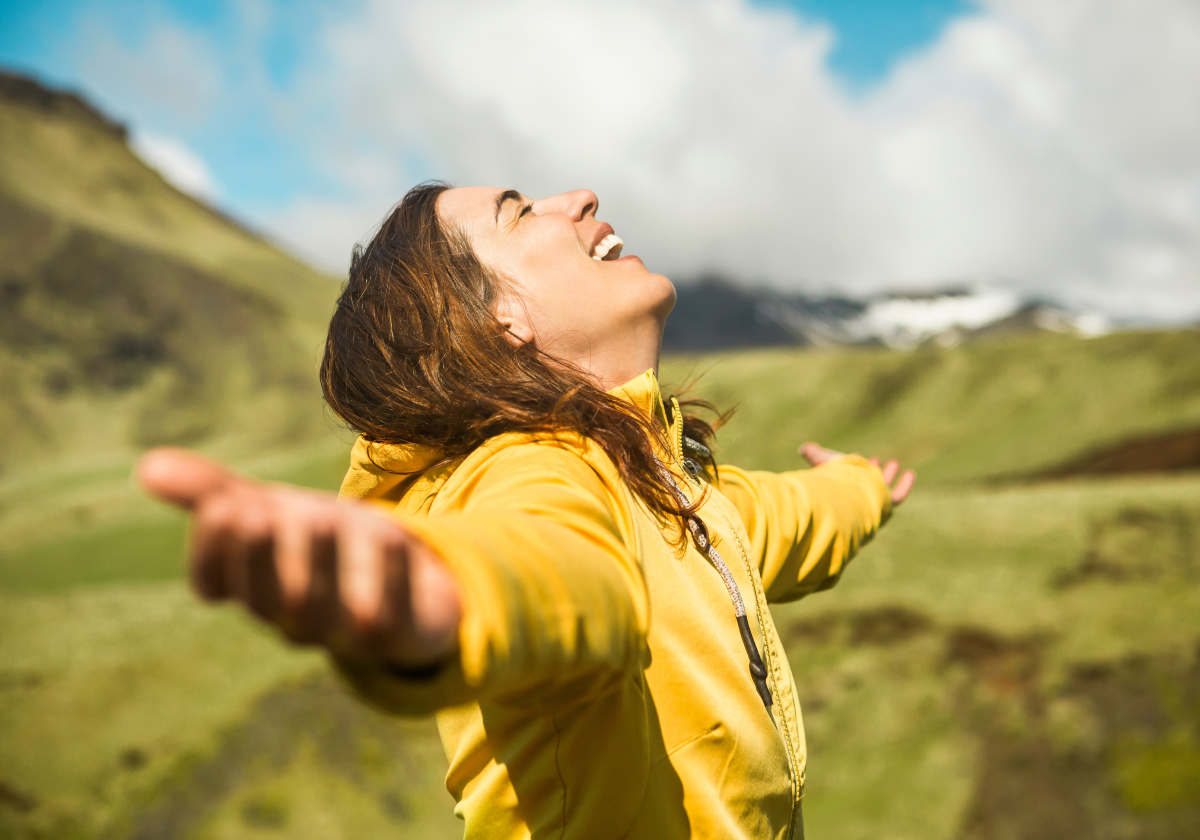
Tightness in the chest, shortness of breath, and obsessively thinking about something going wrong — are all signs of anxiety. It’s nothing we all haven’t experienced, and it’s becoming incredibly more common in our daily lives thanks to our busy and high-pressured lifestyles.
Luckily, psychotherapy and natural remedies for anxiety are also becoming more popular. Read on to learn seven techniques you can do to help calm your nervous system and restore balance to your body and mind.
7 Natural Remedies For Anxiety & Stress
- The Valsalva maneuver
- Bilateral stimulation
- Time in nature
- Mindfulness, meditation, and breathwork
- Movement release
- Safety lists and songs
- CBD, herbs, and essential oils
What Is Anxiety?
Everyone experiences some level of anxiety throughout their lifetime. Feeling uneasy, tense, worried, or afraid are all experiences of anxiety,[1] and it’s a normal part of our life.
Unfortunately, anxiety is often misunderstood as something undesirable. This often makes people feel like they shouldn’t experience this very important emotion, making it feel even worse and affecting their self-esteem.
Anxiety is an essential part of our lives because it helps steer us away from what we don’t want and moves us toward something better. It also puts your body on alert to manage whatever threat its facing.
7 Natural Remedies For Anxiety
These natural calming remedies for anxiety symptoms can be practiced almost anywhere. Start with one or two and slowly add more techniques as you become comfortable with what works for you.
The Valsalva Maneuver
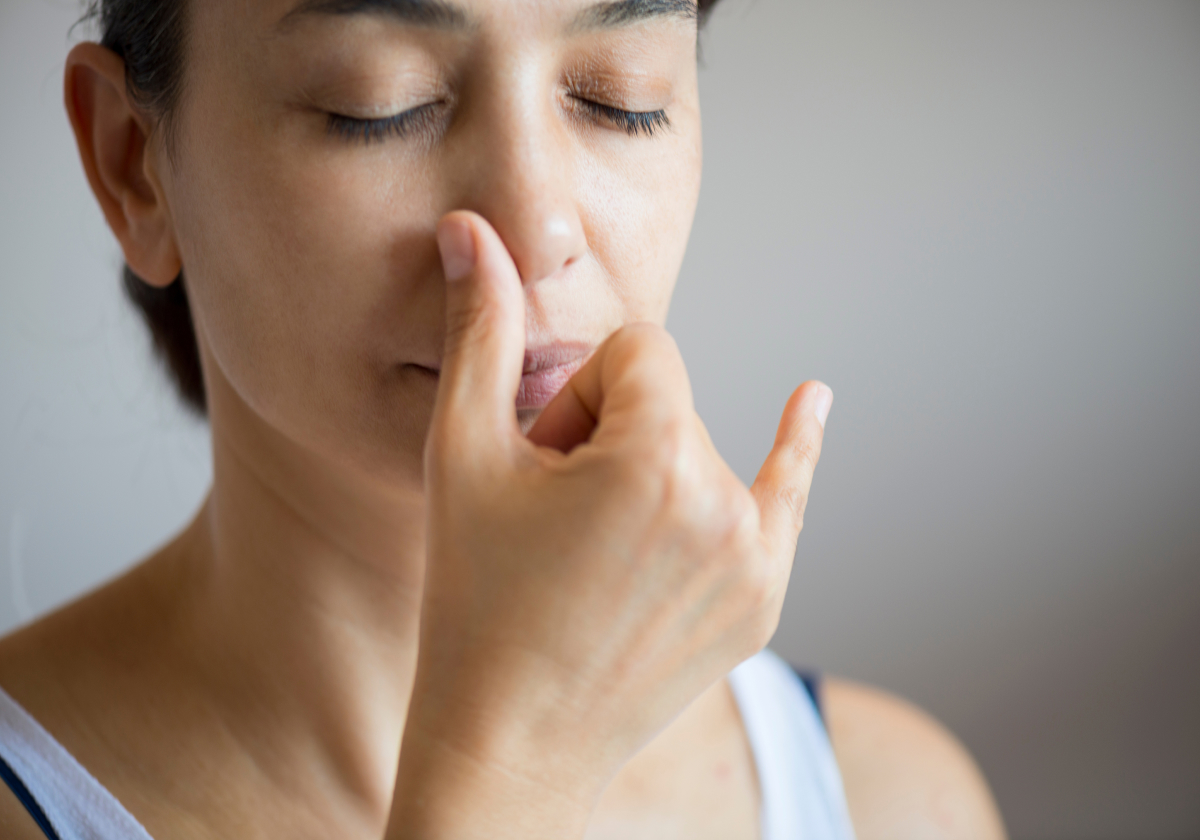
This technique was originally used by doctors to reduce heart rates.[2] It’s becoming studied[3] as a do-it-yourself method for stabilizing your breath and heartbeat when experiencing anxiety. The pressure system of the air buildup can work to lower and stabilize your heart rate.
To perform this maneuver, take a deep breath and hold your nose closed with your fingers to allow the air to swell up inside you. After ten seconds, breathe out through your mouth quickly.
A few deep breaths are all you need, so make sure to rest after giving it a few tries.
Bilateral Stimulation
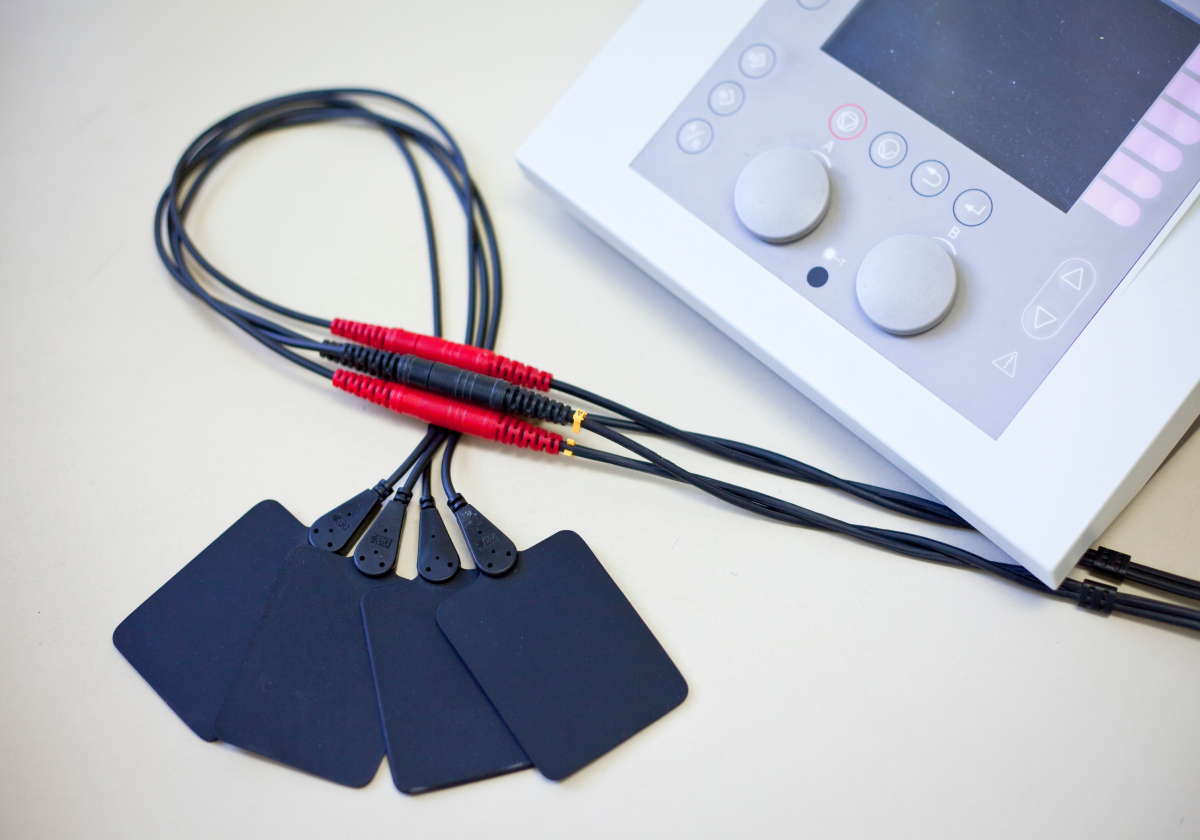
All-natural anxiety remedies have been increasingly studied over the past few decades. Eye movement desensitization and reprocessing therapy,[4] for example, uses bilateral dual attention stimulation to soothe the sympathetic nervous system and reprogram emotional responses to triggers. A licensed therapist will often have their client follow the movement of their fingers with both eyes while targeting a specific negative memory to help reprogram how the brain responds.
Other types of bilateral therapy you can perform on yourself include tapping, using your peripheral vision, and self-massaging.
Tapping
The Emotional Freedom Technique uses a routine of tapping your face and body at specific points to calm anxiety levels. In one study, 76%[5] of people felt complete relief with regular acupoint tapping sessions, compared to 51% of the people in cognitive behavioral therapy. There are a variety of methods and guided tapping sessions available on Youtube.
Using your index and middle fingers, with both hands, begin by tapping above your eyebrows seven times, under your eyes, above your lip, chin, and collar bone, then cross your arms to tap under your armpits. You can repeat this procedure of tapping each spot seven times until you begin to feel calmer.
Self-Massage
As long as you’re stimulating both sides of your body, you have a higher likelihood of reducing stress. It’s beneficial to massage both ears[6] since they can also stimulate the vagus nerve[7] and calm the nervous system. In addition, you can also hug yourself, rub both your sides or back or even massage or tap your quadriceps if you’re sitting.
Peripheral Vision
Begin by staring at one point ahead of you, then slowly pay attention to what’s happening in your left peripheral, then your right. When we’re stressed, we often narrow our vision.[8] Expanding and paying attention to panoramic or peripheral vision can reverse this effect and help to slow your heart rate and blood pressure.
These are great home remedies for anxiety or when you’re in a space where you have to sit, like in a plane, exam room, office, etc.
Time In Nature
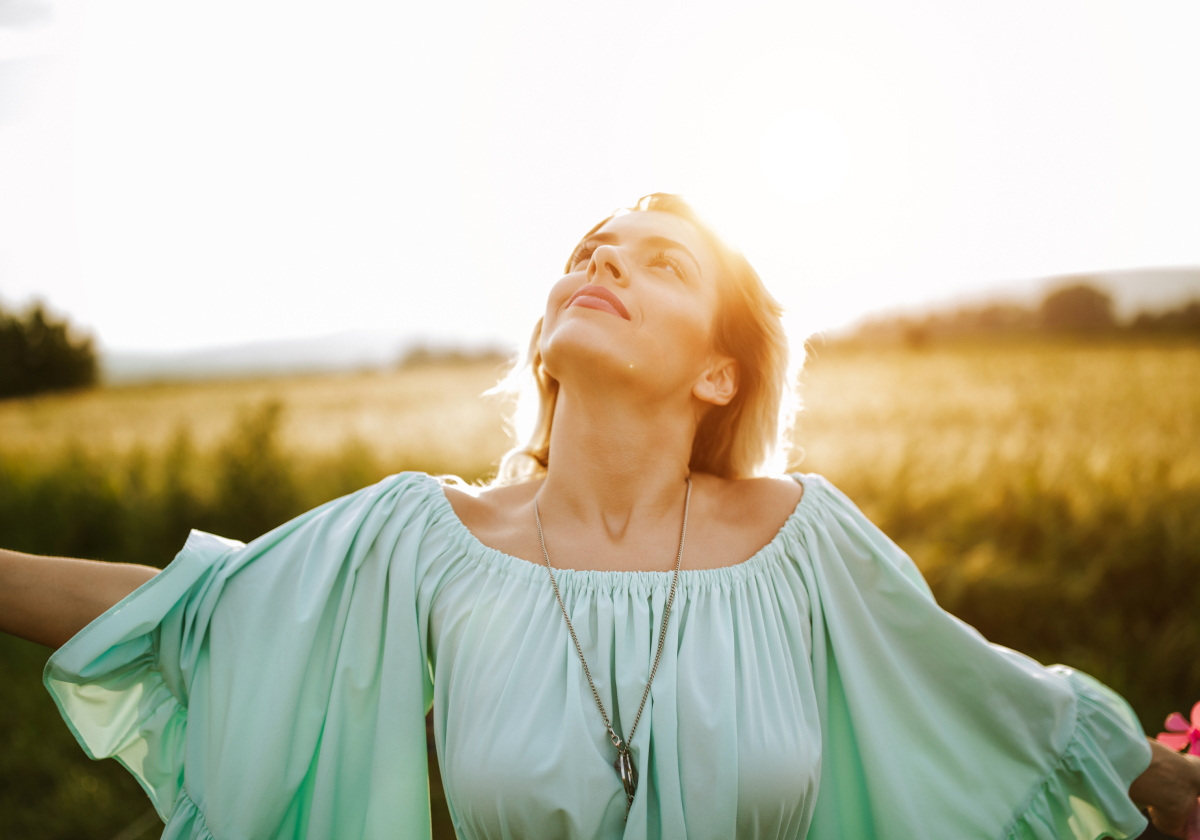
The most underutilized natural anxiety medication is time in nature. It can lower cortisol, the stress hormone, in as little as 10 minutes,[9] even with time spent in your local park. If you can regularly go, whether for a daily walk, weekend picnic, or hike far from the city, 120 minutes a week[10] can dramatically improve overall mental and physical health.
Even though we don’t always realize it, city life can be full of stressful situations. The constant noise and light stimulation can overload your sensory system, along with poor air quality and the stress of commuting. Peaceful sounds and scenery are essential for human health. If you don’t have green space nearby, filling your home with plants[11] and listening to nature sounds also helps.
Mindfulness, Meditation, And Breathwork
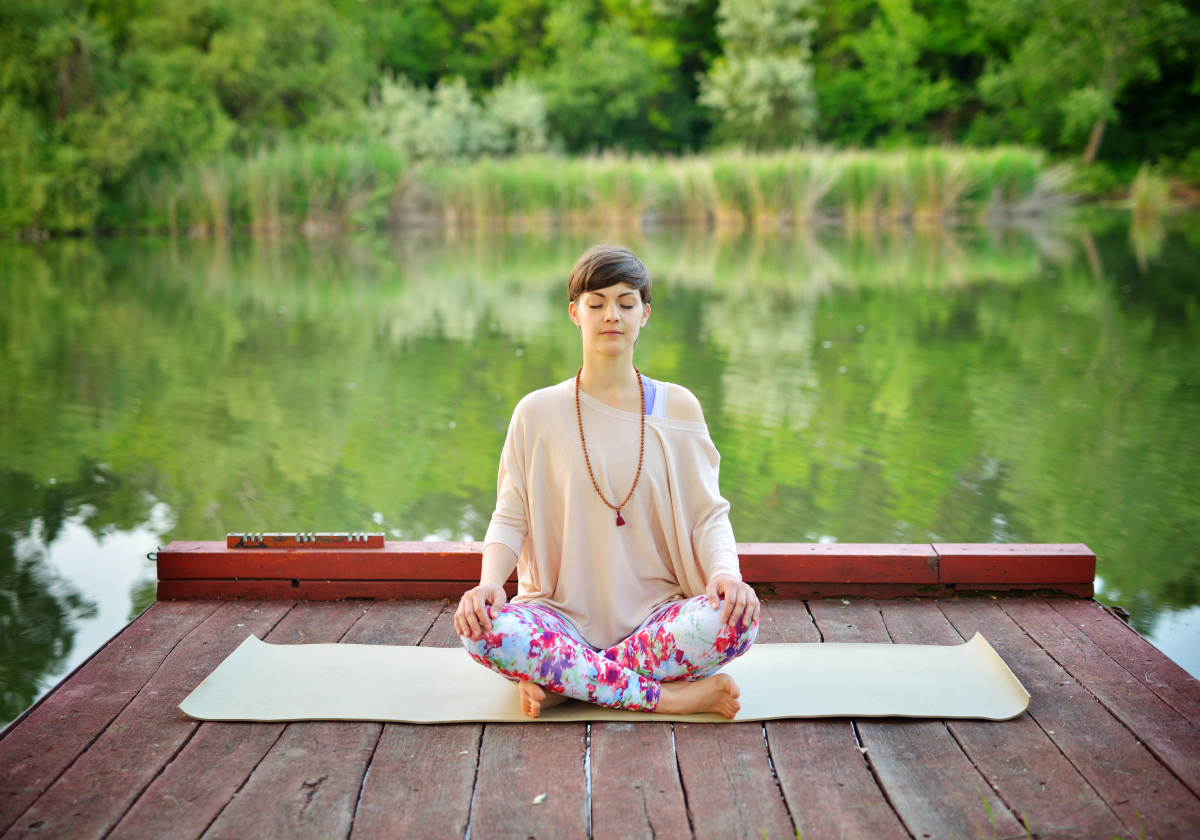
Just ten years ago, many people didn’t think that breathwork or meditation could be a part of their daily life. It was something done by yogis and monks, not the average westerner. All that’s changed now, with yoga practices and meditation retreats becoming popular worldwide.
Meta-analysis reviews[12] on mindfulness-based therapy[13] and stress reduction programs show that they help ease anxiety. It’s something you can do with a therapist or group program, as well. If you’ve had difficulty developing a meditation routine, working with others, whether online or in person, can help jump-start your practice. Yoga, meditation, and breathwork are also easy-to-use natural remedies for anxiety during pregnancy or when managing an illness or chronic condition.
Movement Release
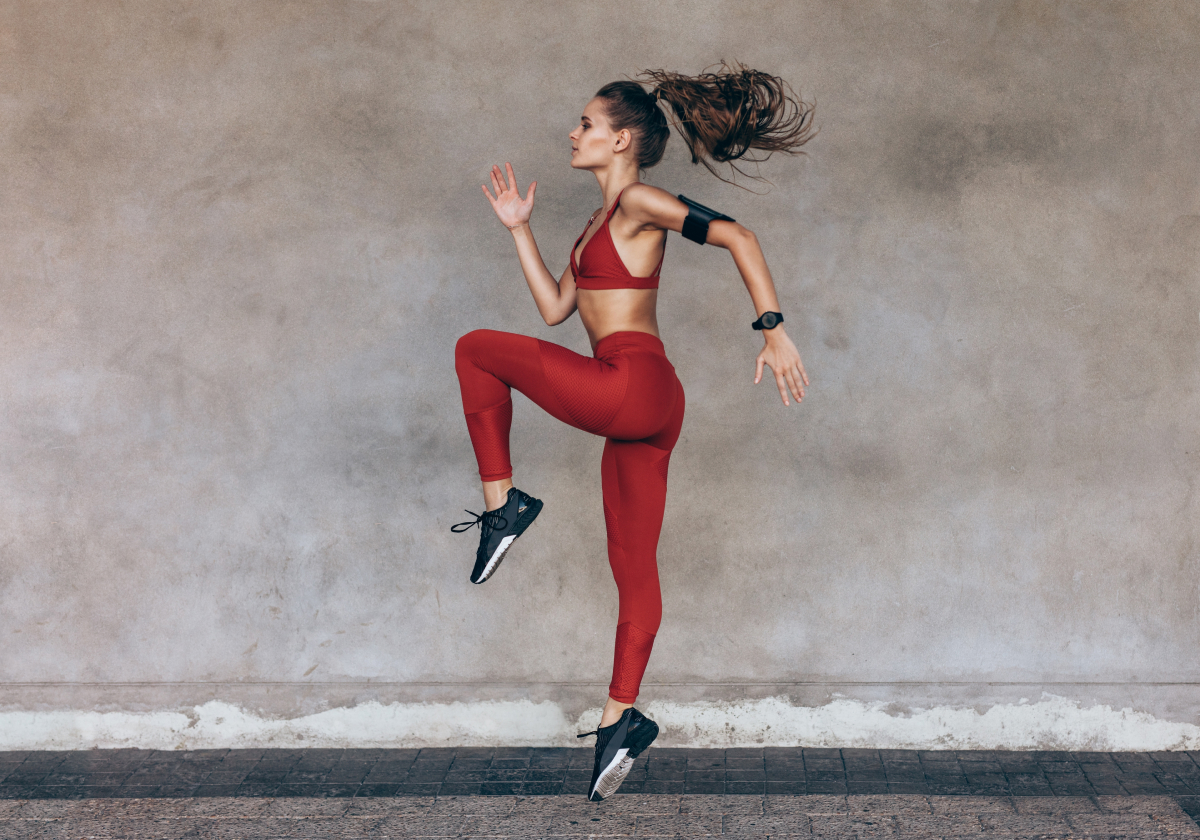
Telling someone to meditate when they’re in the midst of extreme anxiety or panic attack isn’t always helpful. Sitting still with your thoughts when your body is on full alert can feel the opposite of calm in these moments. This is where breathwork through body movement can be most helpful. It doesn’t have to be a slow yoga practice, either.
Sometimes, intense full-body cardio movement is the best way to release all the extra adrenaline and tension. Research shows[14] that high-intensity exercise can be even more effective for reducing anxiety. The movement also forces your body to naturally breathe deeper to allow more oxygen to move. Try putting on upbeat and fast-paced music that makes you want to dance, jump, shake, shout – whatever you need to do to let out that tension and anxiety.
Anxiety and depression can hit adolescents particularly hard, so natural remedies for anxiety in teenage girls using dance therapy can be especially fun, easy, and helpful in releasing tension.
Safety Lists And Songs

Way back in 1965, one famous movie, The Sound of Music, was ahead of its time in terms of all-natural anxiety relief. When a thunderstorm hit and the children become nervous, Julie Andrews belted out the comforting song, “My Favorite Things.” This was smart for two reasons:
- Singing and humming[15] stimulate the vagus nerve and calm the nervous system.
- Writing expressively[16] or thinking about your favorite things and memories[17] can also reduce anxiety.
If you’re alone, try putting on your favorite song and hum or sing alone. It helps to regulate your breath and the vibration calms the vagus nerve.
If you’re not in a place to hum, try writing or thinking about a list of things that bring you comfort. It could be something simple, like watching cute animals play – in which case, you could pull out your phone and watch a funny cat video on youtube. Laughing[18] and smiling also help. A sitcom or quick video can do wonders for your health.
These are also helpful natural remedies for anxiety in children, where playfulness and singing can be more easily encouraged.
CBD, Herbs, And Essential Oils
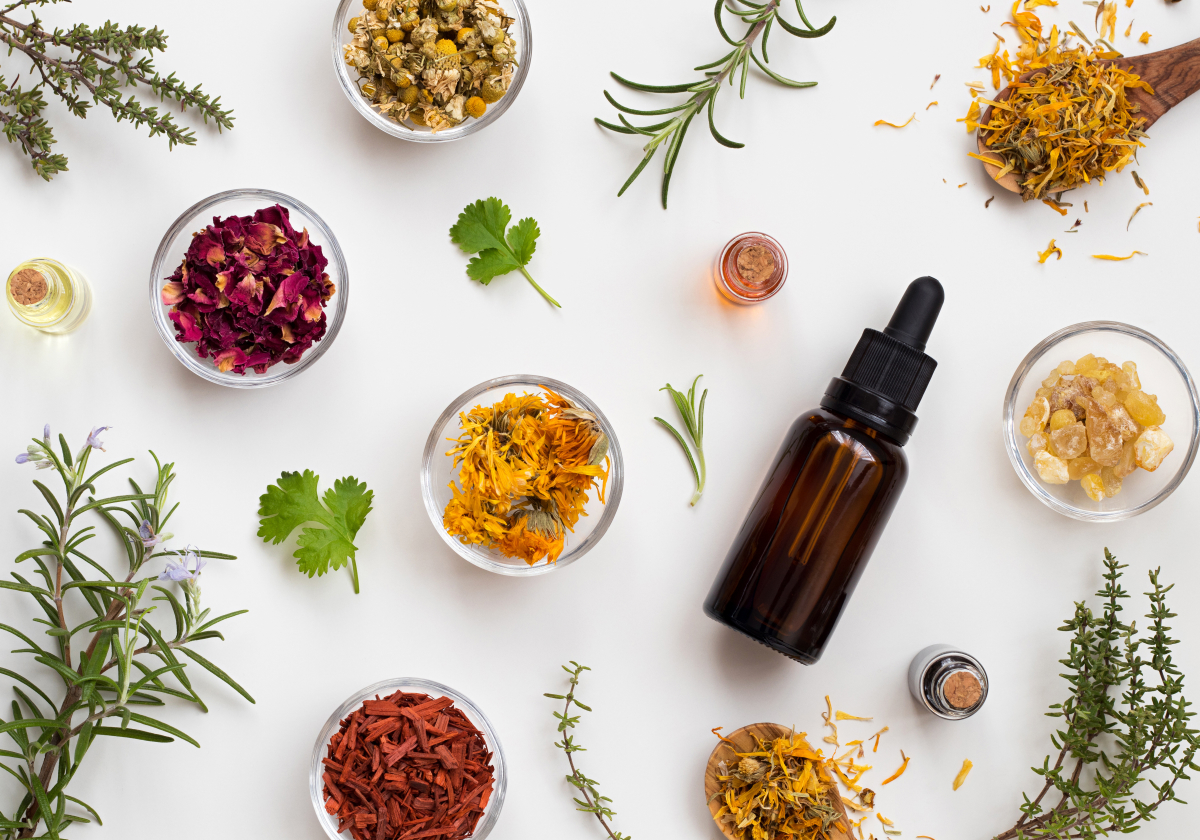
These natural and herbal remedies for anxiety and panic attacks can save you when you’re out of the house and need some comfort.
Cannabidiol, or CBD, is becoming a popular natural remedy to ease anxiety. In one study, it reduced anxiety in almost 80%[19] of people within the first month of use. You can take it in supplement form or through drops under the tongue.
Herbal supplements or herbal teas offer another all-natural anxiety relief[20] with many options to choose from. The popular passionfruit from Brazil has a flower called Passiflora incarnata L.,[21] for example, which is shown to reduce anxiety just as effectively as the drug oxazepam (Serax). There are similar results with other herbs for anxiety, such as valerian root, kava, and lemon balm.[22]
Finally, essential oils offer more benefits than pleasant smells. One study, for example, showed that lavender[23] helped to reduce anxiety for surgical patients post-operation. The oils stimulate the sense of smell which, in turn, causes the brain to release more mood-elevating neurochemicals such as serotonin and dopamine.
How Can I Treat Anxiety?
Whenever we try to stifle or ignore anxiety, it often increases. The body is intelligent, and it won’t easily allow you to forget whatever threat is on your mind. This is why developing emotional awareness and practices that allow you to recognize and self-soothe negative emotions are crucial for allowing anxiety to dissolve naturally.
As you begin to pay attention to the early warning signs your body sends you, you’ll be better able to catch anxiety rising. This is when taking the time to allow yourself to experience your emotions, rather than resisting them, is helpful. You can go inward, sit with the discomfort, and ask yourself what it is you really need and any action you can take to improve whatever’s bothering you.
Another often ignored necessity for treating anxiety is prevention. These seven tips can be practiced regularly, helping to decrease anxiety from arising in the first place. The more actions you take that help to calm your body regularly, the better your chance of avoiding extreme anxiety attacks.
Other Treatment Options
Along with using these seven natural remedies, one of the most effective ways to reduce chronic anxiety is with the help of a mental health professional. Decreasing anxiety through talk therapy[24] is one of the best methods to manage anxiety long-term.
If talk therapy doesn’t feel like enough, there is also the option of adding anti-anxiety medication. Medication for mood disorders works best when combined with psychotherapy,[25] but for anxiety, in particular, talk therapy and self-care practices are often shown to be equally, if not more, helpful than medication alone.
If a psychiatrist recommends medication for anxiety treatment, it’s likely to be selective serotonin reuptake inhibitors or SSRIs, selective norepinephrine reuptake inhibitors or SNRIs, benzodiazepines, azapirones, or antihistamines. Antidepressants[26] are more commonly prescribed than anti-anxiety medications since those who suffer from anxiety often also have depression.
When To See A Doctor
While some anxiety is healthy, experiencing its symptoms for prolonged periods could signify a mood disorder, such as generalized anxiety disorder or GAD.[27] If you feel your life is being disrupted by anxiety, it’s time to visit the doctor. Some common signs of anxiety symptoms include
- Inability to relax.
- Uncontrollable worrying.
- Having a hard time concentrating or making decisions.
- Easily tired.
- Tense muscles.
- Digestive issues.
- Difficulties sleeping.
These physical and mental symptoms can also be signs of other anxiety disorders, such as post-traumatic stress disorder or obsessive-compulsive disorder. It’s always best to get a check-up with a blood analysis whenever mental or physical health issues arise.
The Takeaway
When allowed and understood, anxiety can be an important emotion that helps us manage threats and take action. However, when met with extremely stressful circumstances or resistance, anxiety can take hold and interfere with the ability to manage daily tasks.
Regularly practicing self-soothing, all-natural techniques while visiting a psychotherapist can reduce anxiety symptoms and prevent them from reappearing frequently. Going to nature often, staying active, and tapping are just some of the natural remedies that are effective. Overall, living a healthy lifestyle with plenty of rest, balanced nutrition, emotional awareness, social support, and stress-reducing activities offers the best chance to alleviate anxiety symptoms.
+ 27 sources
Health Canal avoids using tertiary references. We have strict sourcing guidelines and rely on peer-reviewed studies, academic researches from medical associations and institutions. To ensure the accuracy of articles in Health Canal, you can read more about the editorial process here
- NHS Choices (2022). Overview – Generalised anxiety disorder in adults. [online] Available at: https://www.nhs.uk/mental-health/conditions/generalised-anxiety-disorder/overview/.
- Smith, G.D., Fry, M.M., Taylor, D., Morgans, A. and Cantwell, K. (2015). Effectiveness of the Valsalva Manoeuvre for reversion of supraventricular tachycardia. Cochrane Database of Systematic Reviews. [online] doi:10.1002/14651858.cd009502.pub3.
- Shinba, T. (2017). Major depressive disorder and generalized anxiety disorder show different autonomic dysregulations revealed by heart-rate variability analysis in first-onset drug-naïve patients without comorbidity. Psychiatry and Clinical Neurosciences, [online] 71(2), pp.135–145. doi:10.1111/pcn.12494.
- Amano, T. and Toichi, M. (2016). The Role of Alternating Bilateral Stimulation in Establishing Positive Cognition in EMDR Therapy: A Multi-Channel Near-Infrared Spectroscopy Study. PLOS ONE, [online] 11(10), p.e0162735. doi:10.1371/journal.pone.0162735.
- Bach, D., Groesbeck, G., Stapleton, P., Sims, R., Blickheuser, K. and Church, D. (2019). Clinical EFT (Emotional Freedom Techniques) Improves Multiple Physiological Markers of Health. Journal of Evidence-Based Integrative Medicine, [online] 24, p.2515690X1882369. doi:10.1177/2515690×18823691.
- Kaniusas, E., Kampusch, S., Tittgemeyer, M., Panetsos, F., Gines, R.F., Papa, M., Kiss, A., Podesser, B., Cassara, A.M., Tanghe, E., Samoudi, A.M., Tarnaud, T., Joseph, W., Marozas, V., Lukosevicius, A., Ištuk, N., Šarolić, A., Lechner, S., Klonowski, W. and Varoneckas, G. (2019). Current Directions in the Auricular Vagus Nerve Stimulation I – A Physiological Perspective. Frontiers in Neuroscience, [online] 13. doi:10.3389/fnins.2019.00854.
- George, M.S., Ward, H.E., Ninan, P.T., Pollack, M., Nahas, Z., Anderson, B., Kose, S., Howland, R.H., Goodman, W.K. and Ballenger, J.C. (2008). A pilot study of vagus nerve stimulation (VNS) for treatment-resistant anxiety disorders. Brain Stimulation, [online] 1(2), pp.112–121. doi:10.1016/j.brs.2008.02.001.
- Dirkin, G.R. (2016). Cognitive Tunneling: Use of Visual Information under Stress – G. R. Dirkin, 1983. [online] Perceptual and Motor Skills. Available at: https://journals.sagepub.com/doi/10.2466/pms.1983.56.1.191.
- Meredith, G.R., Rakow, D.A., Eldermire, E.R.B., Madsen, C.G., Shelley, S.P. and Sachs, N.A. (2020). Minimum Time Dose in Nature to Positively Impact the Mental Health of College-Aged Students, and How to Measure It: A Scoping Review. Frontiers in Psychology, [online] 10. doi:10.3389/fpsyg.2019.02942.
- White, M.P., Alcock, I., Grellier, J., Wheeler, B.W., Hartig, T., Warber, S.L., Bone, A., Depledge, M.H. and Fleming, L.E. (2019). Spending at least 120 minutes a week in nature is associated with good health and wellbeing. Scientific Reports, [online] 9(1). doi:10.1038/s41598-019-44097-3.
- Lee, M., Lee, J., Park, B.-J. and Miyazaki, Y. (2015). Interaction with indoor plants may reduce psychological and physiological stress by suppressing autonomic nervous system activity in young adults: a randomized crossover study. Journal of Physiological Anthropology, [online] 34(1). doi:10.1186/s40101-015-0060-8.
- Hoge, E.A., Bui, E., Marques, L., Metcalf, C.A., Morris, L.K., Robinaugh, D.J., Worthington, J.J., Pollack, M.H. and Simon, N.M. (2013). Randomized Controlled Trial of Mindfulness Meditation for Generalized Anxiety Disorder. The Journal of Clinical Psychiatry, [online] 74(08), pp.786–792. doi:10.4088/jcp.12m08083.
- Khoury, B., Lecomte, T., Fortin, G., Masse, M., Therien, P., Bouchard, V., Chapleau, M.-A., Paquin, K. and Hofmann, S.G. (2013). Mindfulness-based therapy: A comprehensive meta-analysis. Clinical Psychology Review, [online] 33(6), pp.763–771. doi:10.1016/j.cpr.2013.05.005.
- Aylett, E., Small, N. and Bower, P. (2018). Exercise in the treatment of clinical anxiety in general practice – a systematic review and meta-analysis. BMC Health Services Research, [online] 18(1). doi:10.1186/s12913-018-3313-5.
- Singing for health: an exploration of the issues | Emerald Insight. (2022). Health Education, [online] 102(4), pp.156–162. doi:10.1108\/he.
- Pennebaker, J. (2013). Writing about Emotional Experiences as a Therapeutic Process. Psychological Science, [online] Available at: http://gruberpeplab.com/teaching/psych131_fall2013/documents/13.1_Pennebaker1997_Writingemotionalexperiences.pdf
- Speer, M.E. and Delgado, M.R. (2017). Reminiscing about positive memories buffers acute stress responses. Nature Human Behaviour, [online] 1(5). doi:10.1038/s41562-017-0093.
- Zhao, J., Yin, H., Zhang, G., Li, G., Shang, B., Wang, C. and Chen, L. (2019). A meta‐analysis of randomized controlled trials of laughter and humour interventions on depression, anxiety and sleep quality in adults. Journal of Advanced Nursing, [online] 75(11), pp.2435–2448. doi:10.1111/jan.14000.
- Shannon, S., Lewis, N., Lee, H. and Hughes, S. (2019). Cannabidiol in Anxiety and Sleep: A Large Case Series. The Permanente Journal, [online] 23(1). doi:10.7812/tpp/18-041.
- Lakhan, S.E. and Vieira, K.F. (2010). Nutritional and herbal supplements for anxiety and anxiety-related disorders: systematic review. Nutrition Journal, [online] 9(1). doi:10.1186/1475-2891-9-42.
- Fonseca, L.R. da, Rodrigues, R. de A., Ramos, A. de S., da Cruz, J.D., Ferreira, J.L.P., Silva, J.R. de A. and Amaral, A.C.F. (2020). Herbal Medicinal Products fromPassiflorafor Anxiety: An Unexploited Potential. The Scientific World Journal, [online] 2020, pp.1–18. doi:10.1155/2020/6598434.
- Mount Sinai Health System. (2016). Passionflower Information | Mount Sinai – New York. [online] Available at: https://www.mountsinai.org/health-library/herb/passionflower.
- Braden, R., Reichow, S. and Halm, M.A. (2009). The Use of the Essential Oil Lavandin to Reduce Preoperative Anxiety in Surgical Patients. Journal of PeriAnesthesia Nursing, [online] 24(6), pp.348–355. doi:10.1016/j.jopan.2009.10.002.
- Dialogues in Clinical Neuroscience. (2022). Cognitive behavioral therapy in anxiety disorders: current state of the evidence. [online] Available at: https://www.tandfonline.com/doi/full/10.31887/DCNS.2011.13.4/cotte.
- How (2017). How Do I Choose Between Medication and Therapy? [online] https://www.apa.org. Available at: https://www.apa.org/ptsd-guideline/patients-and-families/medication-or-therapy.
- First-Line Treatment Approaches in GAD. (n.d.). [online] Available at: https://www.psychiatrist.com/read-pdf/10376/.
- NHS Choices (2022). Signs of an anxiety disorder. [online] Available at: https://www.nhs.uk/mental-health/feelings-symptoms-behaviours/feelings-and-symptoms/anxiety-disorder-signs/.



